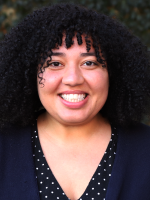For many people, college is about figuring out who you are and what you want to do with your life. Sometimes those lessons come from another person – and you learn things about how the world works that you might not have wanted to learn.
New York Times bestselling author Kiley Reid’s new book “Come and Get It” is a campus novel about dorm life, professors and what it’s like for Millie, a Black resident advisor in a dorm, to look after mostly white college students.
It’s also about Agatha Paul, a professor fresh out of a relationship and new to Arkansas, who’s working on a project that started off being about weddings and ends focusing on the inner lives of the young women in Millie’s dorm. There’s also Kennedy, one of the students in the dorm, who is a lonely transfer with a dark secret.
Reid talked with Briana Rice on the Stateside podcast about the new novel, gossip, and writing from research.
Reid’s 2019 novel “Such a Fun Age,” which was longlisted for the Booker prize, is a biting racial satire. But for her latest novel, Reid wanted to focus on “real people making real mistakes.”

“Come and Get It” explores money and how it operates on campus. But Reid doesn’t see this as a campus novel, rather it’s a dorm novel, where most of the book takes place. The novel also questions the ethics of gossip and secondhand information.
“Agatha definitely does not make some ethical decisions as a journalist, from taking words from young people who don't know they're being recorded. But Millie, our protagonist, you know, she has these cool new friends, and they say things that she also takes as her own, and she pretends like she's the one saying them,” Reid said. “I love the gray area of faults that are not, you know, misdemeanors, but still pretty wrong. We listen to songs all the time that are written about real people, and everyone knows who they're written about. It's a strange line, and I hope I explored that well in this novel.”
Reid wanted the dialogue in the book to sound how college kids really speak. She pulled that off by interviewing real people, including a baton twirler, like Kennedy. Sometimes she used direct quotes from her interviewees in the book.
Though Reid is an assistant professor at the University of Michigan’s Helen Zell writers program and went to college twice, she said that the book is not based on her life.
“I feel like most authors would say that every character is them, and yet none of the characters are them as well,” Reid said. “In terms of this novel, I'm … [an] assistant professor now, like Agatha was. I was an RA for one year, like Millie, and I was voted RA of the year. … And I've been a lonely transfer student like Kennedy as well. So I've definitely dipped in and out of a lot of the worlds of these people. But this is a complete work of fiction, I promise.”
Reid called college a “mini utopia.” But she wanted to explore how that experience changes based on race, economic status and whether or not folks fit in with their peers.
“Within the United States, [college is] one of the only times you'll live in a walkable city. You'll have a lot more free time if you're not working. You can change your major or go to an improv show and meet new people. And there's all of these great shared resources that are usually pretty well funded,” Reid said. “But if you lift up the edges, you'll see pretty quickly that inequality is just as rampant even though students are all going to the same classes or eating at the same place. A dorm room, for me, was such a hothouse for all of these things to happen at the same time, and for that loneliness to really settle in for certain characters.”
“Come and Get It” is Michigan Public Read’s next book club choice. The book club will be held in March in Ann Arbor.
[Get Stateside on your phone: subscribe on Apple Podcasts, Google Podcasts, or Spotify today.]









